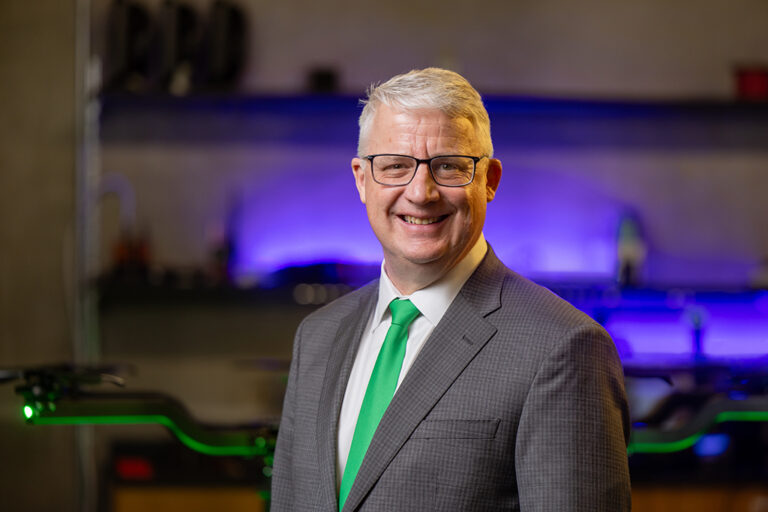One for the ages
UND’s Holly Brown-Borg, an expert in human life span, joins elite company with one of science’s highest honors

Holly Brown-Borg is working to find ways to increase health span – and life span.
“If you live to 100, you want to spend a couple of years in the nursing home, not 20,” said Brown-Borg, Chester Fritz Distinguished Professor of Physiology in the Department of Biomedical Sciences at the UND School of Medicine & Health Sciences. “Who wants to live to 100 if they’re not healthy?”
In recognition of her work, Brown-Borg has just been named a Fellow of the American Association for the Advancement of Science for distinguished contributions to the biology of aging.
She was nominated by Les Klevay, a retired researcher at the Grand Forks Human Nutrition Center and current adjunct professor at the School of Medicine & Health Sciences.
“It’s an honor just to be nominated,” Brown-Borg said. “I was so excited to be named a Fellow. I’m very appreciative. This is national recognition of our research. Science is a team effort.”
Exclusive club
Brown-Borg is joining an exclusive club. Since 1874, just 30 UND faculty have been named AAAS Fellows, one of the highest distinctions scientists can receive. She is one of 416 AAAS Fellows who were announced in the November issue of Science.
At UND, Fellows include Klevay; William Sheridan, Chester Fritz Distinguished Professor of Biology; and Phyllis Johnson, retired vice president for Research & Economic Development. Johnson and Klevay both received the award while they were part of the Grand Forks Human Nutrition Center.
“UND has been supportive – it’s a fantastic environment,” Brown-Borg said. “I’m hoping UND will get more recognition. We have a good reputation, and when we invite people here for seminars, they’re impressed. It’s a good university.”
In addition to being named a Chester Fritz Distinguished Professor in 2010, Brown-Borg has received a lifetime achievement award from the American Aging Association, the UND Foundation Thomas J. Clifford Faculty Achievement Award for Excellence in Research in 2013, the Fellows of the University Award for Departmental Excellence in Research in 2018, and several SMHS Outstanding Block Instructor awards.
Aging expert
An expert on aging, endocrinology, metabolism and oxidative stress, she has dedicated her career to determining how the pathways and mechanisms of hormones might suggest potential therapeutic interventions that could lead to strategies to delay aging, treat aging-related disorders, and extend life span in humans.
She’s especially interested in human growth hormone, which causes humans to grow as children and teens, then the metabolic actions become more apparent as adults. As we age, levels of growth hormone decline.
“Growth hormone causes cancer as you get older,” Brown-Borg said. “If you have lower levels of growth hormone, you age more slowly. If you give growth hormone to an adult, it decreases their fat mass, especially in the abdomen, and increases muscle, but can cause cancer. It’s often abused by athletes, especially in combination with steroids.”
Brown-Borg said that in studies with elderly patients, researchers have found that growth hormone increases muscle and decreases fat, but doesn’t improve function. “Patients stay frail. It causes cosmetic differences, but is also causes diabetes, arthritis, tissue swelling, and lots of negative side effects.”
In other words, she said, low levels of growth hormone in adults are a good thing. Those levels decrease after age 30 and may help prevent cancer.
Increasing health span
So what does help slow aging?
“We tell everyone that moderation is key,” Brown-Borg said of research she and others have conducted. “Don’t overeat or drink too much, and exercise. Then your system ages more gracefully. Live healthier and don’t overindulge.”
One of the primary problems, she said, is abundant and cheap food.
“Our food has so many calories, and people tend to overeat,” she said. “This increases diabetes and cancer.”
Brown-Borg said that she and other researchers want to increase health span more than life span.
“Aging is an important part of life,” she said, adding that small changes and interventions have a big impact on how well or poorly we age.” I find that fascinating. You can change a little and maintain your health longer.”
A lot of research, she said, has found that timing meals makes a difference.
“If you time your eating within a six-hour time frame, your blood cholesterol and glucose profiles are healthier than if you eat all day,” she said. “There are smaller windows for blood sugar and cholesterol fluctuations.”
We all love to eat, Brown-Borg said. But don’t be extreme.
She said human genes are designed for feast and famine and haven’t changed much since the caveman era.
“We are designed to eat, then fast,” she said. “If you eat all day, your insulin rises and falls, which is hard on the body and pancreas. We haven’t evolved to accommodate the Western diet and ready availability of food. That will take another thousand years.”


